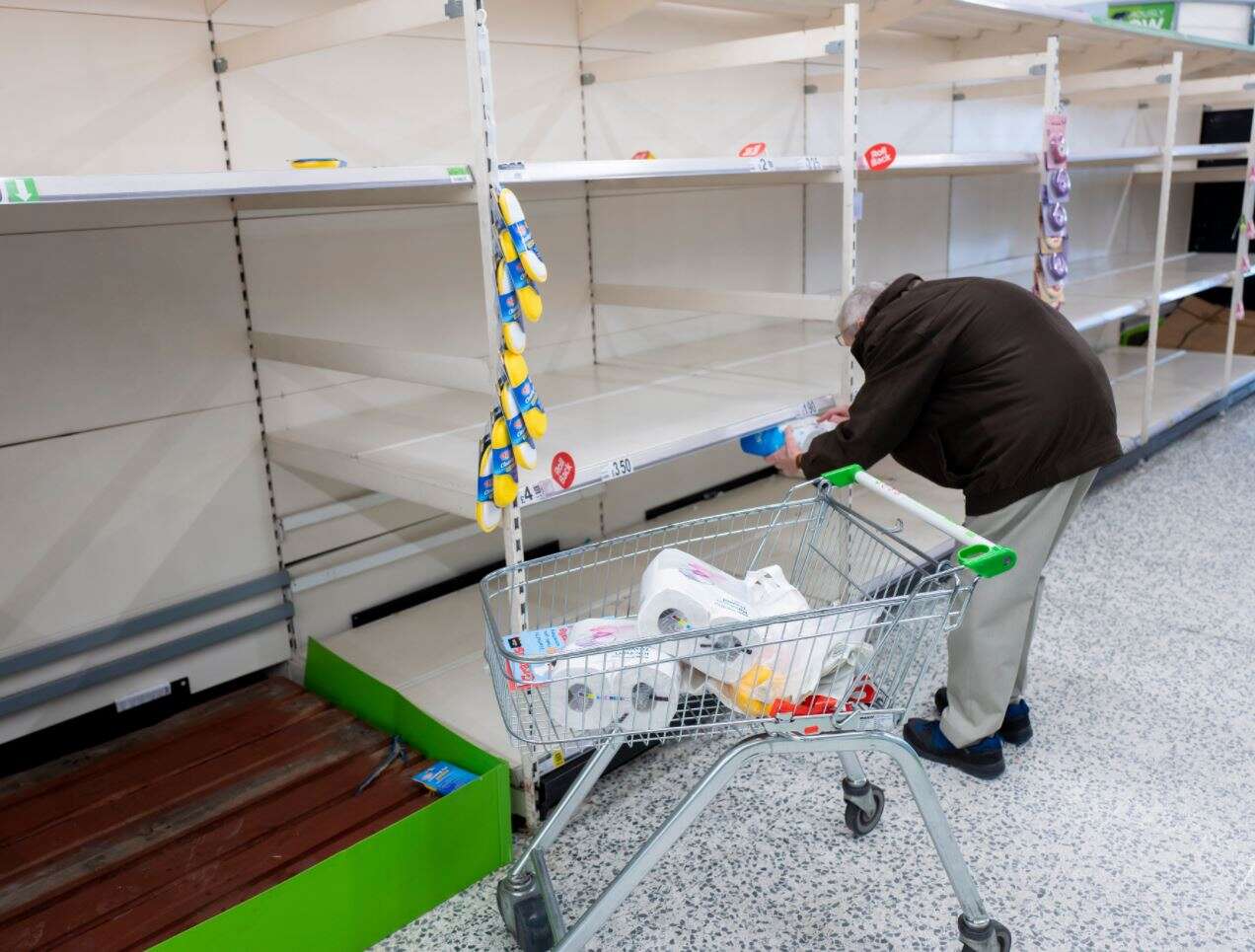
Dan McCrum of the Financial Times has been named the British Journalism Awards Journalist of the Year for his investigation into German payments company Wirecard, which exposed a multi-billion euro fraud.
The Press Gazette awards, now in their ninth year, recognised the best public interest journalism for a UK audience in a virtual ceremony (register here to watch it on-demand) owing to Covid-19 restrictions.
The FT was named News Provider of the Year for a record third time. The BBC’s Emily Maitlis, The Guardian’s Marina Hyde and Matt Lawton of The Times were among the big winners in a year like no other for the industry.
Scroll down for full list of winners and highly commended entries
Scoop of the Year was jointly awarded to the Guardian’s Matthew Weaver and the Daily Mirror’s Pippa Crerar and Jeremy Armstrong for revelations that former top political aide Dominic Cummings broke lockdown rules.
New this year was the Barbara Blake-Hannah Award, named after the UK’s first black on-screen TV news reporter. The award, for the best up-and-coming BAME journalist, went to Kuba Shand-Baptiste of The Independent.
The inaugural Public Service Award went to the Daily Mail for its Mail Force campaign to provide NHS staff and care workers with PPE. The judges said this was “an outstanding piece of journalism which exemplifies the extent our trade can be a force for good”.
Sky News reporter Stuart Ramsay won the Foreign Journalism prize for his coverage of the coronavirus from Italy, including a report from an Italian hospital ward in March which was viewed more than 100m times online.
Press Gazette editor-in-chief and chairman of the judges, Dominic Ponsford, said the awards would “provide a vaccine which I believe is almost 100% effective against any doubts that journalism is the most important and exciting job in the world”.
“Despite furloughs, pay cuts and the challenge of swapping the newsroom for the spare room and the ‘Zoom room’, there has been a huge amount to celebrate and admire about the way journalists have risen to the challenge of covering the biggest story since World War Two,” he added.
Press Gazette recruited some 30 new judges for this year, bringing the total to 80, and made efforts to ensure greater diversity on the judging panel.
A record 900 entries were received, representing every major news organisation in the UK, boosted by efforts to improve the diversity of entries with free entry for women and BAME journalists who did not have an employer willing to cover their costs.
“The result is a set of finalists which is more diverse in every way than we have ever had before,” said Ponsford.
Full list of British Journalism Awards winners and highly commended entries:
Arts and Entertainment Journalism
WINNER: Killian Fox – 1843 magazine, The Economist
The judges said Fox is a “talented storyteller” who has a “real passion for their work”, which is “relevant, revelatory and rammed with research”.
Highly commended: Zing Tsjeng – Vice UK
The judges said Tsjeng “epitomises the strengths of modern journalism – being able to be a one-woman multimedia practitioner across a range of video and writing”.
Business Journalism
WINNER: Dan McCrum, Olaf Storbeck and Stefania Palma – Financial Times
The judges said: “The FT’s Wirecard investigation was an example of business journalism at its best. Brave and dogged, Dan McCrum owned this story and it had widespread ramifications throughout the global financial system.”
Political Journalism
WINNER: Paul Brand and Dominique Heckels – ITV News
The judges said: “The ITV news investigation into the care homes crisis shows the importance of letting a reporter focus on one field and build up real expertise to influence the government on such an important issue. A great example of empathetic and sensitive reporting in the public interest.”
Highly commended: Anna Mikhailova – Daily Telegraph
The judges said: “Anna led the team which uncovered one of the defining stories of the year which led to the resignation of government scientist Neil Ferguson after he hypocritically broke his own lockdown rules.”
Journalism Innovation, sponsored by Google Digital News Initiative
WINNER: Roger Cox – The Scotsman Sessions, The Scotsman
The judges said: “This was a different, warm and appropriate response to the pandemic just as everyone’s access to live events had stopped and their stress levels were high. It kept artists going and it was great to see a newspaper get involved and offer a solution rather than watch from the sidelines.”
Comment Journalism
WINNER: Marina Hyde – The Guardian
The judges said: “This is the second year Marina has taken the prize for comment journalism. Her work is sheer joy. The one must-read of the weekend. Surreal times need sometimes surreal writing. The writing may seem flippant, but it is perfect for this period of politics.”
Photojournalism
WINNER: Anthony Devlin – Getty Images
The judges said: “Anthony Devlin’s images encapsulated three of the biggest UK stories of the last year.”
New Journalist of the Year
WINNER: Rianna Croxford – BBC News
The judges said: “Rianna is a great investigative journalist who constantly reports stories that often go overlooked at the BBC.”
Barbara Blake-Hannah Award
WINNER: Kuba Shand-Baptiste – The Independent
The judges said: “We felt Kuba’s work was very much in the spirit of Barbara Blake-Hannah, in particular her excellent article about the Black Lives Matter protests. It hit all the right notes.”
Feature Writer of the Year
WINNER: Sophie Elmhirst – The Guardian
The judges said: “Sophie has huge literary talent and gets inside stories incredibly well. Three pieces gave a completely new perspective on their subjects. These were moving, sometimes harrowing accounts of people usually overlooked.”
Highly commended: Ashitha Nagesh – BBC News
The judges said: “Ashitha’s subjects were tough ones to tackle. The mental health of the slaughterhouse worker, with its graphic details was compelling. The Uber driver’s death showed how easy it is to slide into the underclass of society and gave a different aspect of the coronavirus crisis. She also has a lovely writing style.”
Local and Regional Journalism
WINNER: Jonathan Gibson – Inside Out West Midlands, BBC Birmingham
The judges said: “This was tenacious local journalism that exposed a huge scandal at some personal risk. We think there’s a lesson here about what might happen if this kind of reporting is too expensive even for the corporation. The democratic deficit in local areas when these things disappear will be extremely worrying.”
Science Journalism
WINNERS: Stephen Grey, Andrew MacAskill, Ryan McNeill, Steve Stecklow, Tommy Wilkes – Reuters
The judges said: “This was absolutely superb journalism. They dug deep into the background and were very early to this story. It was probably the most important series of reports into public health policy during the pandemic, with shattering conclusions for our faith in the government’s assertion they were following the science.”
Health and Life Sciences Journalism
WINNERS: Jack Foster, Fraser Knight – Global’s Newsroom Scotland
The judges said: “This was a robust piece of investigative journalism which got results. It was hard-edged local news reporting at its very best and the fact it is on regional radio gives it even more strength. A horrific story that took effort and passion to expose – and to force an outcome.”
Sports Journalism
WINNER: Matt Lawton – The Times
The judges said: “Matt Lawton’s entries exemplify his professionalism achieved over many years. His interview with Mo Farah at his training camp provides a stunning insight into an ongoing story. Exceptional reporting which has resulted in one criminal investigation into Sport Mobile and the resignation of chief executive Zara Hyde Peters after an extraordinary safeguarding revelation involving her husband. Securing the interview with Farah shows Matt Lawton’s ability to gain trust while asking the difficult questions.”
Highly commended: Jeff Powell – Daily Mail
The judges said: “Powell’s three entries – on Barry McGuigan, Jack Charlton and Hillsborough – provide personal insight along with excellent interviewing technique and illustrate all the skills of sports journalism, honed over decades of great writing.”
Highly commended: Mark Daly, Calum McKay, Kate McDonald, Shelley Jofre, Karen Wightman – BBC Scotland/Panorama
The judges said: “This agenda-setting programme had a widespread impact in athletics, raising serious questions about its governance and Mo Farah’s reputation.”
Interviewer of the Year
WINNER: Emily Maitlis – BBC
The judges said Maitlis’ face-to-face with Prince Andrew was “the outstanding interview of the year” and “a global, agenda-setting scoop”. “It took huge courage and skill to undertake an interview of that stature under pressure at Buckingham Palace,” they said.
Highly commended: Jan Moir – Daily Mail
The judges said Moir’s interview with Barbara Amiel was “the laugh out loud interview of the year”. “No-one can rival Jan Moir’s comic touch and eye for both detail and hilarious colour,” they said.
Highly commended: Emma Barnett – BBC 5 Live
The judges said: “She is so skilled across so many subjects. She knows when to be tough and when to empathetic and has the ability to get people to open up.”
Foreign Affairs Journalism
WINNER: Stuart Ramsay – Sky News
The judges said Ramsay’s coverage of the coronavirus outbreak in Italy was “a very brave piece of reporting which will have changed a lot of peoples’ thinking” and “the story that brought the impact of coronavirus close to home”. They said his “storytelling was fantastic” and his reports “whacked the audience between the eyes and woke Britain up to how serious this pandemic was”.
Technology Journalism, sponsored by Huawei
WINNER: Stephanie Kirchgaessner – The Guardian
The judges described Kirchgaessner’s story, breaking allegations that Amazon founder Jeff Bezos’ mobile phone was hacked by Saudi crown prince Mohammed bin Salman, as “powerful” and “important well-researched journalism, creating a powerful narrative”. They added: “We know what the Saudis do to journalists they don’t like so it was not without personal risk too.”
Highly commended: Karl Flinders and editorial team – Computer Weekly
The judges said Computer Weekly deserved recognition for its “sustained investigation and campaigning” on this Post Office IT scandal over a decade. “This won justice for people who had been appallingly treated with many lives ruined. It turned a tech story into a major public interest campaign, showing the value of the B2B sector in the process.”
Marie Colvin Award
WINNER: Sophia Yan – The Telegraph
The judges said: “She has a tenacity and seriousness of purpose that Marie Colvin would have admired. Xi Jinping’s China is one of the most important and most difficult countries in the world to cover, which is one reason we so admired her reporting. Like Marie, Sophia is determined to get to the truth, exposing cruelty, injustice and the abuse of human rights despite all attempts to stop her.”

Crime and Legal Affairs Journalism
WINNERS: Samantha Poling, Eamon T. O Connor, Shelley Jofre and Mona McAlinden – BBC Scotland
The judges said “huge journalistic skill” was involved in putting together Disclosure: Who killed Emma? which they said “forensically examines a police operation and puts prime suspects in front of the camera”. They added: “This investigation uncovered damning shortcomings in the police investigation and shed new light on an unsolved murder.”
Highly commended: Lizzie Dearden – The Independent
The judges said: “Lizzie Dearden has produced a range of high-quality exclusive stories on huge matters of public interest.”
Specialist Journalism
WINNER: Lawrence Dunhill – Health Service Journal
The judges said: “This was agenda-setting journalism and one of the most critical stories of the year as we were going into lockdown in the UK. It showed the huge value of journalists who have a specialist beat in these areas. This was a story which had a massive impact and played a crucial role informing the national debate.”
Highly commended: Zak Garner-Purkis – Construction News
The judges said: “For a specialist journalist to go to this level of dedication is way beyond the norm. Breathtaking dedication to finding out the truth and putting your life in danger to report a story. Dramatic stories with massive implications for the wider construction industry.”
Scoop of the Year
WINNERS: Matthew Weaver – The Guardian | Pippa Crerar and Jeremy Armstrong – Daily Mirror
The judges said: “This was the must-read story of the pandemic and the one which made readers choke on their cornflakes.”
- Pressure on Dominic Cummings to quit over lockdown breach
- Dominic Cummings ignored coronavirus lockdown rules for SECOND time to visit parents
Anti-corruption Investigation of the Year, sponsored by Global Witness
WINNERS: Juliette Garside, David Pegg, Hilary Osborne, Jason Burke, Caelainn Barr and Paul Lewis – The Guardian
The judges said of The Guardian’s Luanda Leaks investigation: “This was a thorough investigation into corrupt practices at the heart of government in Angola, testing the relationship between first-world businesses and government officials and exposing levels of corruption which led to the downfall of the previous president’s daughter and billionaire husband.”
Investigation of the Year
WINNERS: Richard Bilton, Andrew Head, David Gray, David Howell, Seamas McCracken, Farhad Mohammadi, Matt Bardo, Hannah O’Grady and Rachel Jupp – BBC Panorama (in collaboration with Jonathan Calvert, George Arbuthnott and David Collins of the Sunday Times Insight team)
The judges said: “This was an example of proper determination to tell an important story that was guaranteed to cause offence to senior government and military officials. It took the resources of the BBC to investigate this global story touching on Afghanistan and Iraq. It was particularly significant in the context of the Overseas Operations Bill, which seeks to impose a shorter five-year limit on prosecutions against soldiers serving overseas, as it this shows that atrocities can take a long time to come light.”
Highly commended: Dan McCrum, Olaf Storbeck, Sam Jones, Paul Murphy and Helen Warrell – Financial Times
The judges said of the FT’s Wirecard investigation: “This is in the finest tradition of financial investigation. A real in-depth research on a consistent basis refusing to give in to intimidation from very powerful people in business and finance.”
Highly commended: Mobeen Azhar, Jeremy Lee, Wes Thomas and Catey Sexton – BBC Three
The judges said of Hometown: A killing that it was “dogged reporting and Mobeen Ashar was not afraid to tell inconvenient truths”. They added: “This was a riveting investigation which brought the audience with him. The reporter challenged his own preconceptions about the case. Original, compelling, revelatory and so much in the public interest. It changed the nature of the debate in Huddersfield to confront a huge social problem, the culture of drugs and easy money.”
Campaign of the Year
WINNER: Time To End Cystic Fibrosis Drug Scandal, Daily Express (Chris Riches)
The judges said: “The paper became a champion for a group that could not speak up for itself and was being ignored and that is the most heart-warming thing you can do as a journalist. As a result, it improved the lives of many young people. It had an ambitious aim of making life-saving drugs available and achieved it, winning appreciation from an under the cosh health secretary.”
Highly commended: Mail Force, Daily Mail (Robert Hardman)
The judges said: “This campaign was all about action, not words. They raised the money, rented the aircraft, picked up the PPE and distributed it. This was a jaw-dropping campaign which left the rest of Fleet Street standing at a time when help was urgently needed for the NHS. Above and beyond the call of journalism.”
News Provider of the Year
WINNER: Financial Times
The judges said: “Coronavirus was the story which dominated this year and it was a story which produced an abundance of data.
“The Financial Times did a superb job using skills honed over many years covering the numbers surrounding business to explain an unfolding human tragedy. Its charts and visualisations explaining the pandemic became the most read content in its history.
“Its landmark investigation of the year on Wirecard helped bring down one of Germany’s most garlanded companies. The paper showed huge courage and needed all its resources to face down an aggressive and well-resourced opponent which appeared to have the backing of the German state.
“Across the board the FT has continued to punch well beyond its niche with quality journalism which has been quite simply exemplary. For a record third year the FT is an extremely worthy news provider of the year.”
Public Service Award
WINNER: Mail Force, Daily Mail (Robert Hardman)
The judges said: “There are few news organisations in the world which can rival the Daily Mail for campaigning verve and sheer chutzpah when it takes on an issue. At a time when it felt like the country, and the newspaper industry, was on its knees the Mail showed that journalism can do far more than just expose problems and shortcomings – it can channel its energy towards providing solutions, in this case in dramatic and potentially life-saving fashion.”
Journalist of the Year, sponsored by Camelot
WINNER: Dan McCrum – Financial Times
The judges of McCrum’s investigation into Wirecard: “This was brave financial journalism carried out by a dogged journalist and backed with huge commitment by the Financial Times. Dan McCrum faced down intimidation, surveillance and personal threats as well as a campaign of disinformation to bring down one of Germany’s most garlanded businesses.”
Congratulations to all this year’s winners.
For links to articles, see the BJA 2020 shortlist.
Email pged@pressgazette.co.uk to point out mistakes, provide story tips or send in a letter for publication on our "Letters Page" blog



